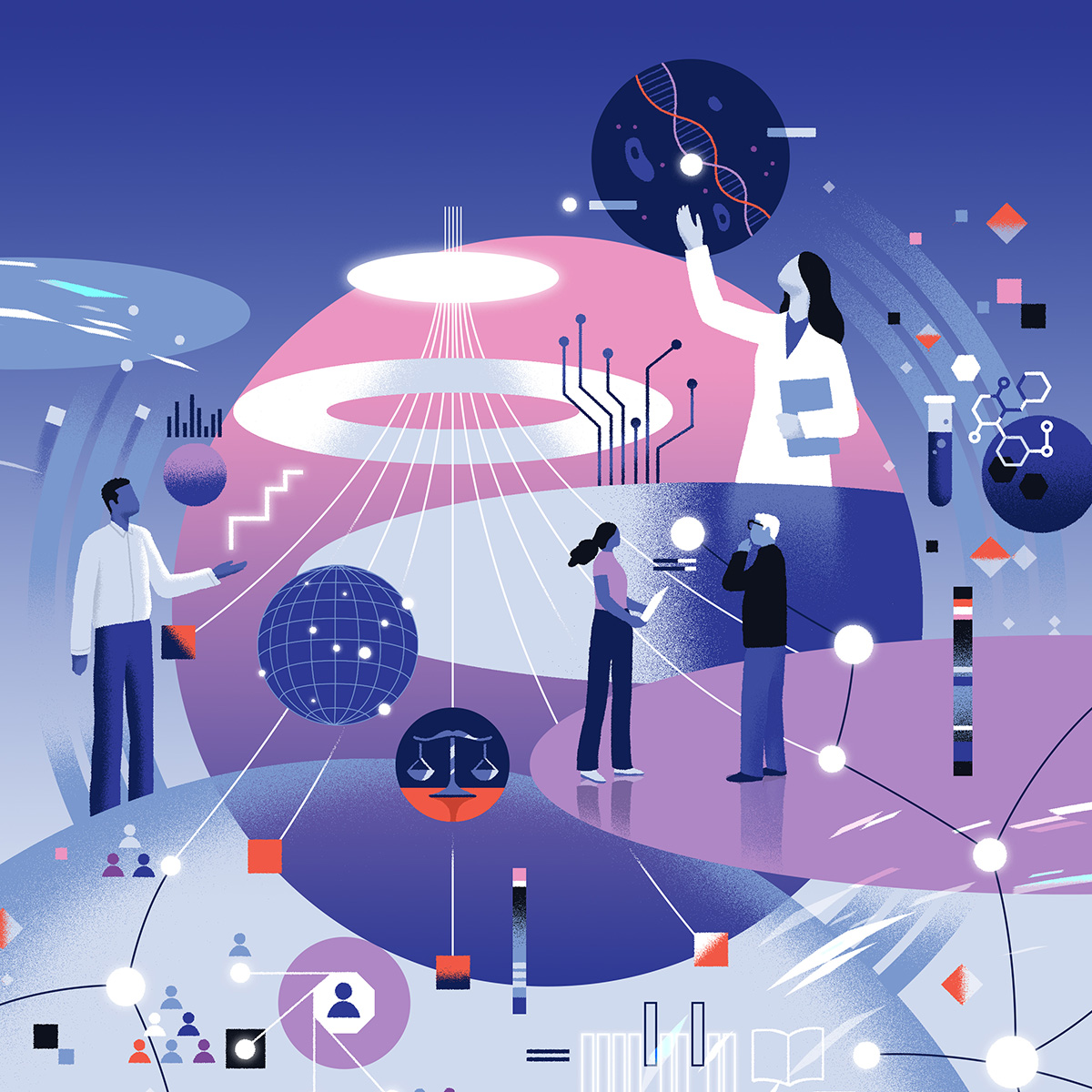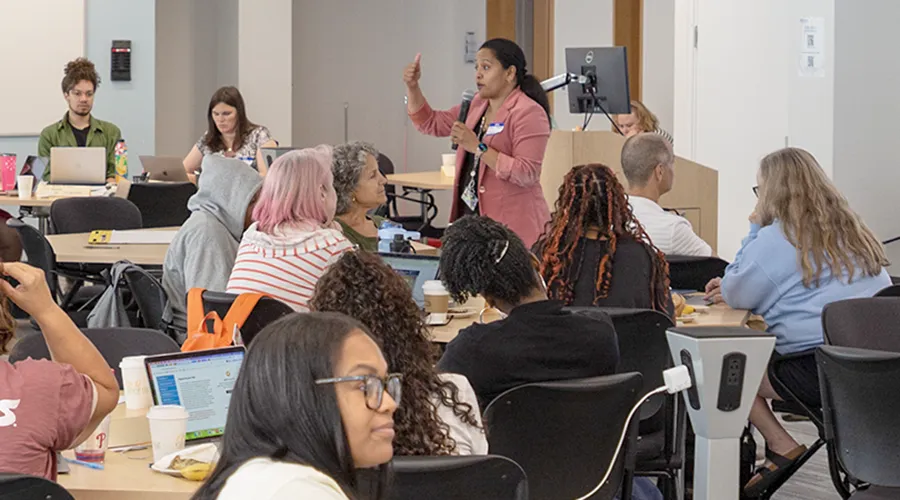What if? The imagination behind those two words has fueled countless discoveries.
Harnessing the Possibilities of Artificial Intelligence
With new resources, facilities, and initiatives, Penn is bringing together researchers from across disciplines to spur the next generation of AI breakthroughs
It’s the question that inspired Penn’s founder Benjamin Franklin to fly a kite into a lightning storm, and it’s the question that drives researchers at every school in the University today.
What if scientists could create custom molecules for RNA-based health care treatments? What if researchers could generate virtual environments just by describing them in a few sentences? And what if designers could use robots to turn some of the world’s oldest building materials—like clay bricks—into modern, sustainable components?
Thanks to artificial intelligence (AI), those ideas no longer fall into the category of what if? The question now is what’s next?
How do we equip Penn students to understand the myriad ways AI will touch the world? This is a fascinating challenge, since AI itself is evolving rapidly. We want our students to play leading roles in the next chapters of this story.”Bhuvnesh Jain
Walter H. and Leonore C. Annenberg Professor, Department of Physics and Astronomy, Penn Arts & Sciences; Co-Director, Penn Center for Particle Cosmology; Co-Director, Data Driven Discovery Initiative
The latest advances in artificial intelligence are helping Penn scholars and researchers rethink what is possible. With new tools and technologies powered by AI, the solutions to previously unsolvable problems are suddenly within our grasp.
To guide Penn in this new era, the University’s newly established AI Council is forging AI and data science connections across diverse fields to inspire new breakthroughs. The Council will provide strategic input, coordinate cross-disciplinary research, and catalyze new initiatives for Penn’s expanding leadership in the ethical use of AI—embodying the goals set forth in the University’s strategic framework, In Principle and Practice. The inaugural Council members are senior faculty members who are leaders in AI research.
Penn AI Council
Key early philanthropic investments are also buoying Penn’s work in AI. In 2019, Harlan Stone, C’80, PAR’13, a Trustee and Penn Engineering Advisor, made a lead gift to enable the construction of Amy Gutmann Hall, providing a new physical hub for interdisciplinary AI innovation. And in 2023, Raj and Neera Singh, PAR’10, PAR’11, endowed the first undergraduate degree program in AI at Penn Engineering—and the first of its kind in the Ivy League—as well as the new online Master of Science in Engineering degree in AI. These options add to the more than 20 other data science–related degrees and programs across the University. Philanthropy will continue to be vital to Penn’s leadership in the field, and there are opportunities to make a significant impact in a myriad of specific areas of study and implementation.
With the help of AI, new doors to discovery are opening every day.”Eric Bradlow
K.P. Chao Professor and Vice Dean of AI & Analytics at the Wharton School
“All 12 of Penn’s schools are actively engaging with AI tools across disciplines, uniquely positioning Penn to further faculty research, curricular innovation to our students, efficiencies and new opportunities for staff, and greater impact of our work to alumni worldwide,” says Eric Bradlow, K.P. Chao Professor and Vice Dean of AI & Analytics at the Wharton School. “With the help of AI, new doors to discovery are opening every day.”
“Today, because of the widespread interest in AI, we are finding more areas of mutual interest with our colleagues in different fields,” adds Marylyn Ritchie, the Edward Rose, MD, and Elizabeth Kirk Rose, MD, Professor and Vice Dean of Artificial Intelligence and Computing at the Perelman School of Medicine. “This also leads to more innovative and impactful research, as the creativity from diverse scholarly viewpoints often leads to new discoveries and new ways of thinking about a problem or question.”
Tools for Discovery
One way Penn is powering interdisciplinary research is through the Penn Advanced Research Computing Center (PARCC), which will make AI research accessible to faculty in every discipline. Once complete, the center will be a platform for computational and data-driven research, providing hardware, software, system support, and consulting services to all students and faculty. And as a hub for computational research across all 12 of Penn’s schools, PARCC will provide University-wide support and resources that will be essential for the next breakthroughs in data science and AI.
PARCC will come online in two phases. Phase I, which will be available to researchers in spring of 2025, includes a high-performance computer data cluster housed at a regional colocation data center, which will double Penn’s current processing capacity.
Phase II will provide additional resources, including data science consulting on campus, to meet the increasing needs and growth of the computational research community at Penn.
Penn is leading the way in AI innovation—advancing science, society, health, and business with groundbreaking and transformative applications. Here are just a few examples.
![]()
AI Foundations
The mathematical and algorithmic foundations of AI underpin its remarkably broad applications. Penn researchers are exploring why AI methods work when they do, examining why they fail, and discovering the fundamental principles that will enable the next generation of AI advances.
► Computer scientists and engineers are developing algorithms with a wide range of capabilities—from allowing robots to navigate and interact with a three-dimensional environment to extracting complex information from images, text, and videos.
![]()
AI + Health
AI is unlocking our understanding of biological systems and enhancing modern medicine.
► At Penn Medicine, Penn AInSights, an AI-guided imaging system, helps create a more precise, three-dimensional view of internal organs.
► Researchers at Penn Nursing have used AI to create an early warning system that accurately detects patient deterioration far sooner than was previously possible.
► Penn Engineering researchers are using AI to find new potential antibiotics inside the human gut microbiome.
![]()
AI + Society
Scholars at Penn are investigating how AI can be used ethically and how AI can teach us what it means to be human.
► Researchers at Penn Carey Law are showing how AI can help reduce eyewitness misidentifications, one of the largest known contributors to wrongful conviction.
► The Graduate School of Education is launching Pioneering AI in School Systems (PASS), a professional development program to help teachers and school leaders effectively harness the power of AI in the classroom and develop policies around AI use, which is being piloted in the School District of Philadelphia.
► Psychologists at Penn Arts & Sciences are using AI to better understand how we think—how we reason, make social decisions, store memories, and conceptualize the world around us.
![]()
AI + Science
With AI tools, scientists are building global climate models, exploring the nature of matter, and learning the structure of proteins.
► Researchers at Penn Engineering and Penn Medicine are constructing “self-driving” scientific laboratories that can perform thousands of experiments at a time.
► Penn astronomers are making new discoveries about the nature of the universe by applying AI to big data astronomy.
![]()
AI + Business
Penn is defining what the future of industry could look like as AI advances in capability, enhances productivity, and potentially changes the nature of our relationship with work itself.
► The Wharton AI & Analytics Initiative (WAIAI) leads in advancing
the application of AI and analytics to drive business innovation, bridging cutting-edge technology with actionable insights for today’s complex challenges.
► The AI & Analytics Accelerator transforms classroom knowledge into impactful learning experiences, equipping students to tackle real-world business challenges using advanced AI and analytics tools.
What’s Next?
AI at Penn will impact all aspects of life and society. With advanced computing power, a unique infrastructure and culture at Penn that supports interdisciplinary research, and a new physical hub for innovators to catalyze ideas across disciplines, artificial intelligence is showing just how many answers there are to the question: What if?
To learn more about AI at Penn, visit ai.upenn.edu, the University’s campus-wide online platform launched by the AI Council. To learn how you can support AI work at Penn, contact Wylie Thomas at wthomas@upenn.edu.







